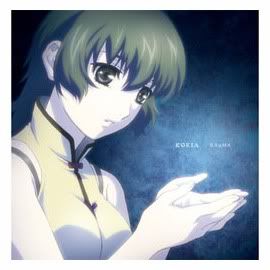Well, this is out of my own leisure this time; and no imaginative pressure this time

SO, I've been watching Digimon Adventure in Japanese which is pretty awesome. A few things that are rather annoying of course like the repetitive digi-volving or should i say the "shinka" haha. *shrugs* It is an anime aimed at kids...Everyone remembered Digimon? Good times in my childhood. I'm currently watching it in Japanese. In the end, the difference between the original jap and the dub US version isn't terrible compare to say Cardcaptors? Hah. Still, I fully recommend you watching it in its original Japanese voices :] There's a lot of fun jokes in there that U.S. translation wouldn't pick up hehe.
 Anyway, being the anime nerd that I am, I picked up Hikari's voice which sounded pretty familiar which gave me a bad feeling... it's that bad feeling of an annoying anime character. What popped up? Chibiusa... Looked it up and I was right. It's somewhat a shame since I adore Hikari, but at times when she speaks up... That cursed pink-haired chibi thing pops up. (Sorry Chibiusa fans, but she just rubs me the wrong way). I looked it up and well I was right heh. Araki, Kae...Not sure if she's done anything recent lately... Hard to tell unless I want to go through that list... and I don't haha.
Anyway, being the anime nerd that I am, I picked up Hikari's voice which sounded pretty familiar which gave me a bad feeling... it's that bad feeling of an annoying anime character. What popped up? Chibiusa... Looked it up and I was right. It's somewhat a shame since I adore Hikari, but at times when she speaks up... That cursed pink-haired chibi thing pops up. (Sorry Chibiusa fans, but she just rubs me the wrong way). I looked it up and well I was right heh. Araki, Kae...Not sure if she's done anything recent lately... Hard to tell unless I want to go through that list... and I don't haha. Another one popped up. Our lil Pinocchimon (aka Puppetmon) sounded very familiar. So, seriously, I think this seiyuu is starting to become my favorite. Afterall, she is the voice of the kawaii Chi-chan! It just works for someone psychotic; in yet, retains a cuteness that you can't just... shy away (TAMAMA-DESU!) First thought was indeed Private Tamama! And yes, I was right. Kozakura, Etsuko is too awesome-DESU.
Another one popped up. Our lil Pinocchimon (aka Puppetmon) sounded very familiar. So, seriously, I think this seiyuu is starting to become my favorite. Afterall, she is the voice of the kawaii Chi-chan! It just works for someone psychotic; in yet, retains a cuteness that you can't just... shy away (TAMAMA-DESU!) First thought was indeed Private Tamama! And yes, I was right. Kozakura, Etsuko is too awesome-DESU.I think i'll start uploading the episodes...
以上













